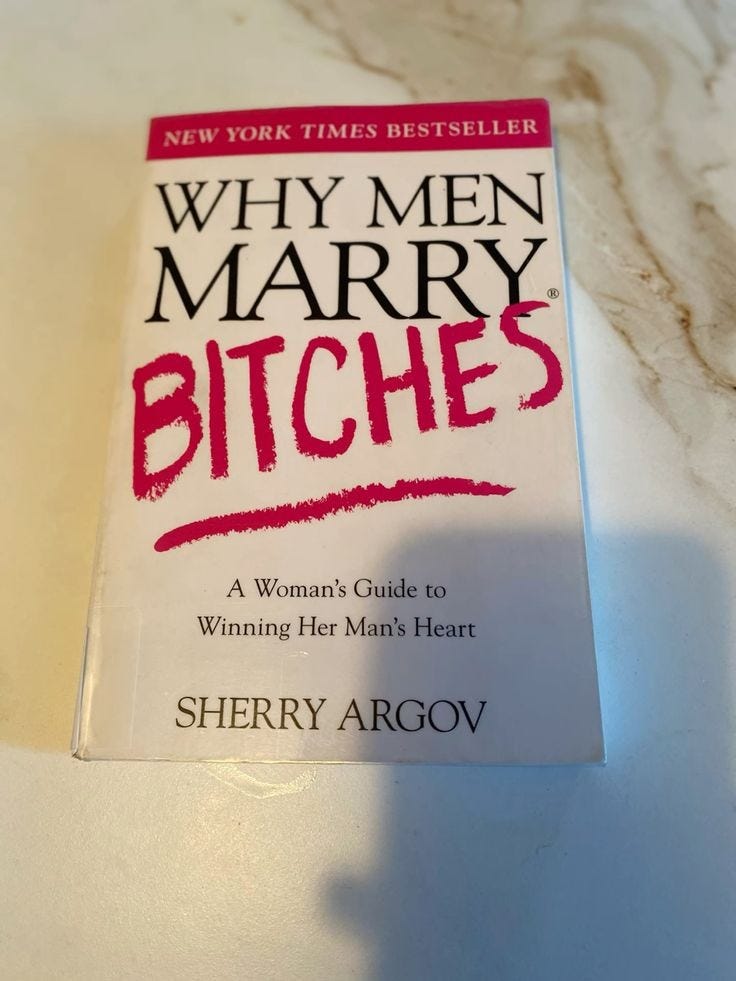“He could have any woman he wanted, but he chose her... the one who was difficult to deal with.”
That’s how the book Why Men Marry Bitches opens. And right off the bat, I had questions.
This series isn’t just a critique—it’s a deeper dive into what the book is actually teaching.
Not just on the surface, but in the subtext.
The stuff you only catch when you slow down and listen between the lines.
In each post, we’ll unpack a different aspect of the book. Some of the topics on the table:
Why the book romanticizes emotional unavailability
How “bitch” becomes a brand, not a boundary
The psychology behind “playing hard to get”
The hidden rules women are still expected to follow
What actual empowerment could look like (spoiler: it’s not this)
Let’s Start with the Introduction
The author, Sherry Argov, paints the “difficult” woman as someone who wins in the end.
The man didn’t marry the sweet girl who waited on the phone.
He marries the one who didn’t care if he called but the language is telling.
Words like difficult, hard to get, aloof—these aren’t neutral. They’re how society codes confidence, independence, and self-assurance in women as negative traits.
And instead of challenging that bias, Argov kind of... plays into it. She just rebrands it.
She claims she’s empowering women. But really? It’s the same old guide to shaping yourself into what a man will tolerate—just this time with more attitude and lip gloss.
Let’s Call It What It Is
People have been telling women how to land a man since forever.
This book isn’t breaking new ground it just dresses up the same advice in hotter packaging. Argov says she’s offering insight into why some relationships don’t work out—but somehow, the blame always falls on the woman.
She describes men doing objectively manipulative things—like testing your boundaries or pulling away to “see how you react”—without ever calling that out. Instead, she tells you how to pass the test. As if you should want to pass it.
As if this is the game, and your job is to play it better. Not to question why it exists.
The “Bitch” Brand™
She defines a “bitch” as a woman with her own identity, who’s secure in herself, sounds great on paper.
But then she turns around and advises you to be emotionally unavailable, calculated, and always one step ahead in the dating power dynamic.
That’s not the opposite of empowerment it's just performance.
That’s becoming the kind of woman who can survive mistreatment, rather than insisting on not being mistreated in the first place.
She’s not teaching women to choose better. She’s teaching them to manipulate better.
And that’s not the same thing.
Some Fair Points (and Where They Go Off the Rails)
Argov makes one good point: some women are more in love with the idea of marriage than the man they’re dating. That’s real.
Some people focus so much on being chosen that they forget to ask if the person doing the choosing is even worth it.
But then… she undercuts it.
Any woman who dares to ask “Where is this going?” is painted as desperate. Needy. The dreaded N-word: naggy.
As if emotional clarity is a weakness.
She tells women to be unpredictable, To never reveal their feelings first, to keep men guessing.
And listen, I get the appeal of mystery. But that’s not connection. It's strategy.
And strategy doesn’t build intimacy—it builds tension. Exhaustion. Detachment.
Eventually, you get tired of pretending not to care. Of being cool and casual when all you want is closeness. And then what?
What’s Coming Next
This post is just the intro. Think of it as the trailer. Over the next few weeks, I’ll break down the book chapter by chapter—or theme by theme.
Here’s a taste of what’s ahead:
Chapter One: Throwing Out the Rulebook
Chapter Two: Make Him Chase You Until You Catch Him
Chapter Three: The Sun Rises and Sets in His Boxer Shorts
Chapter Four: Female Button Pushing – A Time-Honored Male Tradition
Chapter Five: Wanted—Joe Paycheck
Chapter Six: Breaking into the Boys’ Club
Chapter Seven: From “I Might” to “I Do”
We’ll talk manipulation tactics, pop feminism, gendered double standards, and what healthy emotional dynamics actually look like.
Spoiler: it’s not tricking someone into commitment by acting indifferent.
Next Week’s Post:
Why the “bitch” isn’t as rebellious as you think she is… and what that tells us about how women are still being told to behave.
Until then—stay sharp, stay sceptical, and remember: real power doesn’t require pretending you don’t care.
💬 Want to chime in?
Drop a comment. Share your story. Or send me the wildest dating advice you’ve ever heard—I might feature it in an upcoming post.
Previous||Next





I read this book in my 20’s…….. and I remember thinking “I’m never getting married. I don’t think I have what it takes to be a bitch.”
What a great introduction to the much needed deconstruction of a dangerously deceptive book.